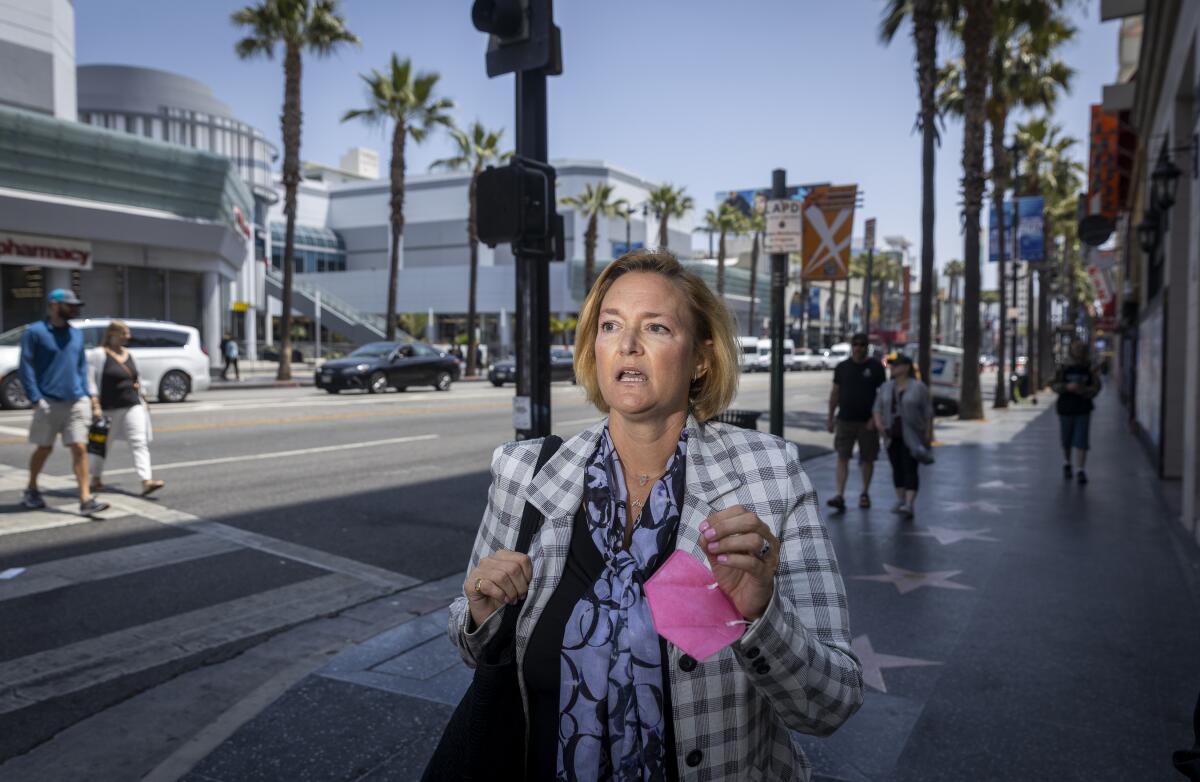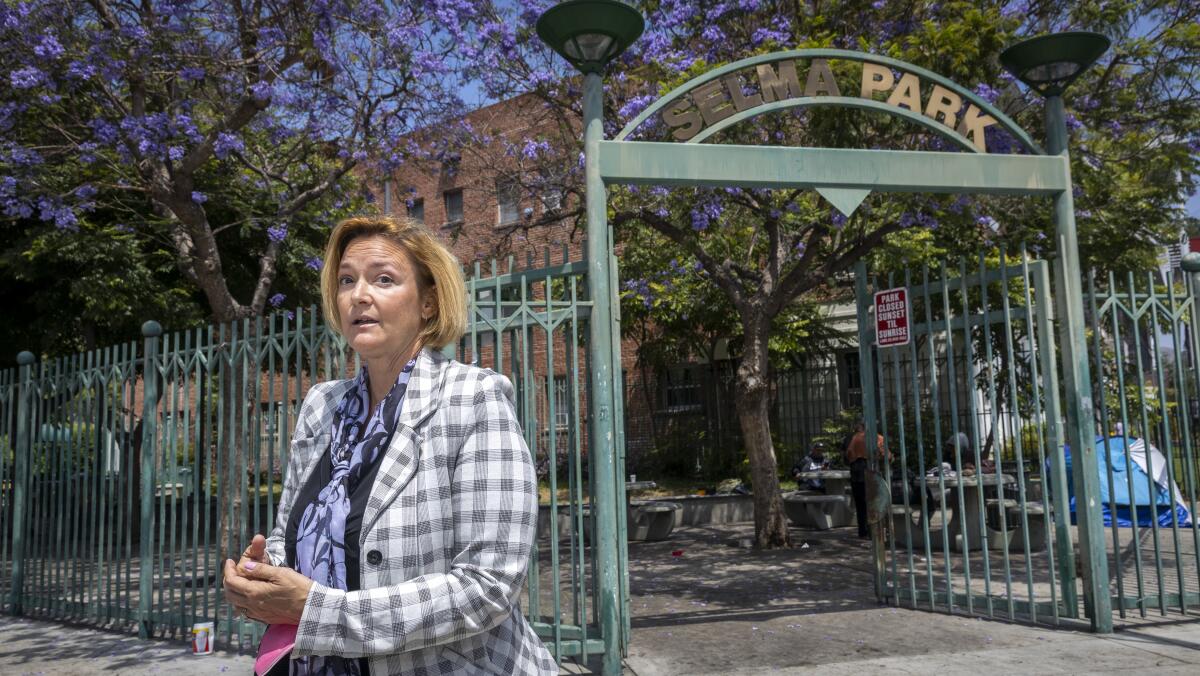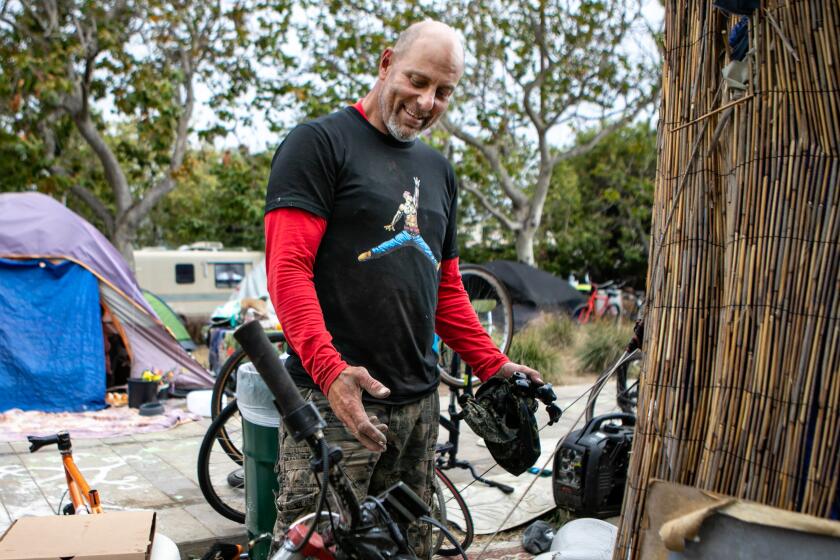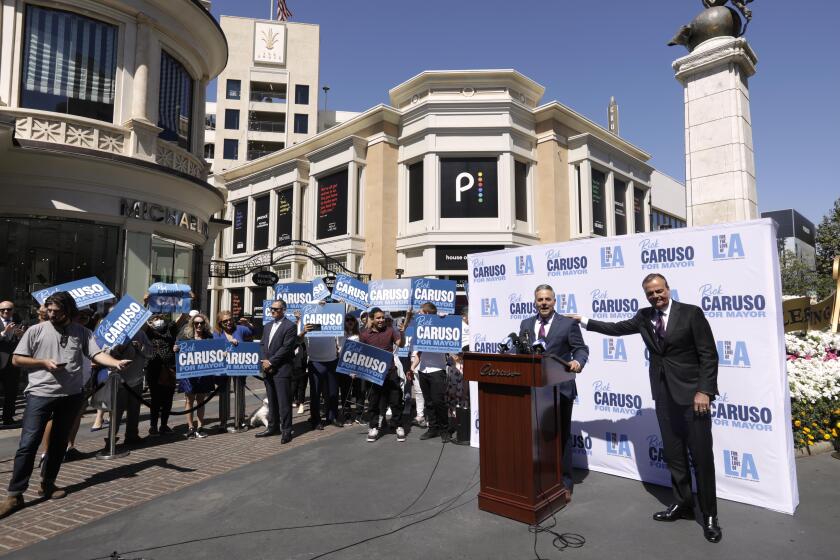Mayoral candidate Gina Viola wants social services, not police officers

- Share via
Los Angeles activist Gina Viola marched in the streets with thousands of frustrated Angelenos two years ago after George Floyd’s murder. A member of an anti-racist group for white people, she was overwhelmed to see the support for Black lives.
Now, Viola finds herself in television studios and on debate stages, explaining why she should be elected to replace Mayor Eric Garcetti in the June 7 election.
She’s drawn support from leaders of Black Lives Matter-Los Angeles and left-leaning activists who agree with the central message of her campaign: eliminating the Los Angeles Police Department over time and redirecting the money toward social services.
Viola, 53, has been polling in the single digits and raised over $40,000 in donations. Still, the Hollywood Hills resident edged out one of her rivals, Councilman Joe Buscaino, running ahead of him in a Times poll before he dropped out of the race.
The question is how many voters will embrace Viola’s calls for dramatic changes to policing and city spending.
The City Council earlier this month voted to increase spending at the LAPD. Only one of the council’s 15 members, Mike Bonin, voted against the budget, saying that city leaders hadn’t made enough progress in their effort to “reimagine public safety.”
One candidate would carry on the progressive ways of retiring incumbent Mike Bonin. But most others in L.A.’s Council District 11 say they would increase policing and remove homeless encampments.
Annual city spending on the overall police budget, which includes pensions, has hovered around $3 billion in recent years, far greater than what is spent on other city departments. The ills plaguing L.A. are the “end result of decades-long disinvestment of communities,” Viola said.
“We aren’t well as a society,” Viola said.
A new face to voters, Viola is known in some activist circles. She’s a member of White People 4 Black Lives, and was a regular presence at police commission meetings and downtown rallies to protest then-Dist. Atty. Jackie Lacey. She spent weeks outside Getty House in 2020 to oppose Garcetti’s possible appointment to a Cabinet position in the Biden administration.
Supporters say she often works behind the scenes. She wears an orange vest to protect protesters from being hit by cars. At internal meetings of Street Watch L.A., a homeless advocacy group where she volunteers, she encourages others to speak.
“She lets other people shine,” said Theo Henderson, a fellow Street Watch L.A. member who has worked alongside Viola at Harbor City, Hollywood and downtown.

Viola registered as a mayoral candidate at the “last hour of the last day” of the city’s filing deadline after she and other activists were disillusioned by the policing plan put forward by Rep. Karen Bass (D-Los Angeles), another mayoral candidate. Bass wants to hire police officers to maintain authorized staffing levels and civilian personnel, arguing that people don’t feel safe in L.A.
There were a few “intense days” of discussions among activists about who should run and Viola agreed to. “I realized I could not do something that I was asking others to do,” Viola said.
Viola was raised on Long Island. Her mother eventually moved to Twentynine Palms to join a Buddhist commune. Viola followed, attending high school in Yucca Valley where she had “terrible culture shock.” She went on to UC Riverside, where she majored in political science.
Married and the mother of two teens, Viola runs a company that staffs trade shows and conventions. She also spent several years volunteering as a board member and mentor at Girls & Gangs, a nonprofit that helped girls coming out of probation camps in the L.A. County.
Belinda Smith Walker, the group’s former executive director, remembers Viola as a volunteer who stood out and called her “very wise.”
“If you are an outstanding mentor for high-risk youth, you are available to them 24/7,” said Smith Walker. “And Gina was. And she was there for the long haul.”
Today, Viola hires disadvantaged youths at her staffing agency, saying it’s a way to merge her activism with her job.
Walking through Hollywood during an interview, she praised Councilwoman Nithya Raman for emphasizing outreach to the unhoused in her district, which stretches from Los Feliz to Sherman Oaks.
At a recent mayoral debate on homelessness co-sponsored by The Times, Viola called for converting empty buildings into housing and said that she opposed Gov. Gavin Newsom’s proposal to forcibly remove mentally ill people from the streets because she thinks they’ll end up in prison.
At one point, she tangled with Councilman Kevin de León, who defended the “tiny homes” he has erected in his district. “It’s a toolshed,” she countered.
The councilman has clashed with activists over the city’s approach to homelessness. De León, who represents downtown, accused Street Watch L.A. members this year of trying to persuade unhoused people to remain on the sidewalk and offering them $20 to remain, rather than take offers of shelter.
Organizers with Street Watch have called the councilman’s allegations absurd and said the group counsels the unhoused on their options. Viola said the city has “vilified mutual aid workers.”
Beyond her proposals to help people on the street, Viola’s public safety plans have earned her a dedicated following. “I’m the infamous defund-the-police candidate,” she said at a recent UCLA-sponsored debate.
Get the lowdown on L.A. politics
Sign up for our L.A. City Hall newsletter to get weekly insights, scoops and analysis.
You may occasionally receive promotional content from the Los Angeles Times.
In reality, her defund plan is more of a “phase-out,” she said. She wants to forgo hiring new officers and anticipates shrinking the force through retirements — a process that could take decades. She admits that she has to “get in there and see what I am able to do. I have to work with the city attorney.”
Viola also acknowledged that some neighborhoods don’t want fewer police officers. She has also proposed adding violence prevention workers and creating academies to hire high school graduates as community leaders. She wants to support domestic violence workers and fund youth development.
“Healthy-resourced communities are safe communities,” Viola said.
A representative for the Los Angeles Police Protective League, the union representing police officers, declined to comment on Viola’s campaign. The union is supporting developer Rick Caruso, who wants to hire 1,500 additional cops.
Appearing on the online program “Women Crush Wednesday” last week. Viola took aim at Caruso and his promise to “clean up L.A.”
Caruso has used the slogan to describe his promise to address crime, homelessness and corruption at City Hall, but Viola accused Caruso of running for mayor to grow the LAPD and said that he wants to “whiten the city” by criminalizing poverty.
The Grove has hosted multiple campaign events in recent weeks as Rick Caruso’s Disney-esque mall has become an unlikely L.A. campaign destination.
“He doesn’t want to see any color in the city,” Viola said. “I’m sorry, a vote for Rick Caruso is a vote for white supremacy. White supremacy is codified into our legal system created to build white wealth, and law enforcement is its watchdog.”
Caruso campaign spokesman Peter Ragone called Viola’s comment “disturbing” and said Caruso has support from a broad cross section of Angelenos, including activist “Sweet Alice” Harris, businessman Andy Camacho, and Chang Lee, chairman of the Korean American Chamber of Commerce.
More on the mayoral race
“We need more uniting of our diverse communities,” Ragone said. “We need more community policing to bring down crime and a compassionate approach to homelessness. Rick can unite L.A.”
Political leaders in Los Angeles and some other progressive cities rushed to cut police budgets after Floyd’s death. But L.A. increased the city’s police budgets in subsequent years, while also unveiling new programs to send unarmed responders to nonviolent crimes.
Viola said she’s troubled by the adoption of recent police terms, such as “smash and grab” burglaries, a term she compares to the phrase “super predator,” which was used in the 1990s to describe repeat offenders and helped perpetuate racism and fear.
Black Lives Matter-Los Angeles co-founder Melina Abdullah, who has endorsed Viola, praised her “willingness to put herself on the line for Black freedom.”
Abdullah quoted Charlotta Bass, the pioneering Black journalist and activist, to describe how Viola’s candidacy has brought attention to policing and the defund movement.
“Win or lose, we win by raising the issues,” she said.
More to Read
Sign up for Essential California
The most important California stories and recommendations in your inbox every morning.
You may occasionally receive promotional content from the Los Angeles Times.













